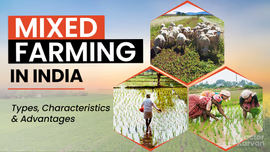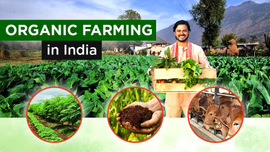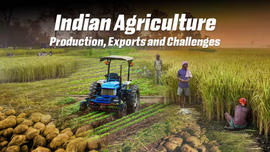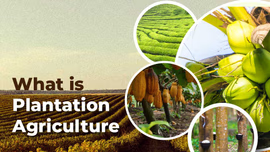Step-by-Step Guide to Mulching for Indian Farms: Types, Process and Best Practices

Mulching, a sustainable practice in agriculture, aims to improve soil health and enhance crop productivity. It involves covering the soil to create favourable conditions for the proper growth of plants. Mulching can help earn immense profits in agriculture if properly done. So, let us understand mulching, its types and how to get the best results from mulching in this blog.
Table of Contents
- What is Mulching?
- What are the Different Types of Mulches in India?
- What are the Benefits of Mulching in Agriculture?
- What are the Different Mulching Techniques Used in India?
- How to Apply Mulch to Obtain Maximum Benefit in Agriculture?
- Which Irrigation Practices are followed under Mulching in India?
- What are the Limitations of Mulching in India?
What is Mulching?
Mulching is the method of covering the topsoil with plant material, such as crop residues, leaves, straw, grass, twigs, and other inorganic substances, to reduce water evaporation losses and create favourable conditions for better plant growth. Mulching helps conserve soil moisture, reduce soil temperature, reduce weed growth, and increase crop yields. It can be done organically or inorganically, depending on the requirements of the crop. Farmers in India use different types of mulching based on their crops. Let's understand the various types of mulches used in agriculture.
What are the Different Types of Mulches in India?
Mulches are categorized into two types in India: organic and inorganic mulches. Let’s discuss each of them one by one:
Organic Mulches
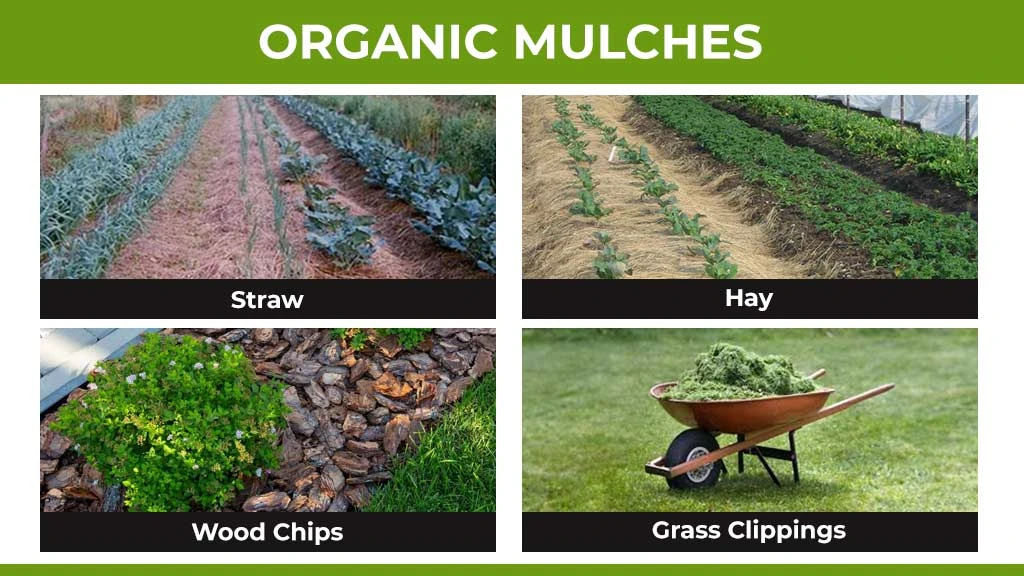
Organic mulches are those that decompose naturally over time, like agricultural wastes, which are used as mulch. These agricultural wastes include bark chips, wheat or paddy straw, grass clippings, compost, plant leaves, sawdust, rice hulls, and many others. These materials decompose over time, improving the soil’s water-holding capacity. This agricultural waste breaks down, providing the soil with necessary nutrients.
Inorganic Mulches
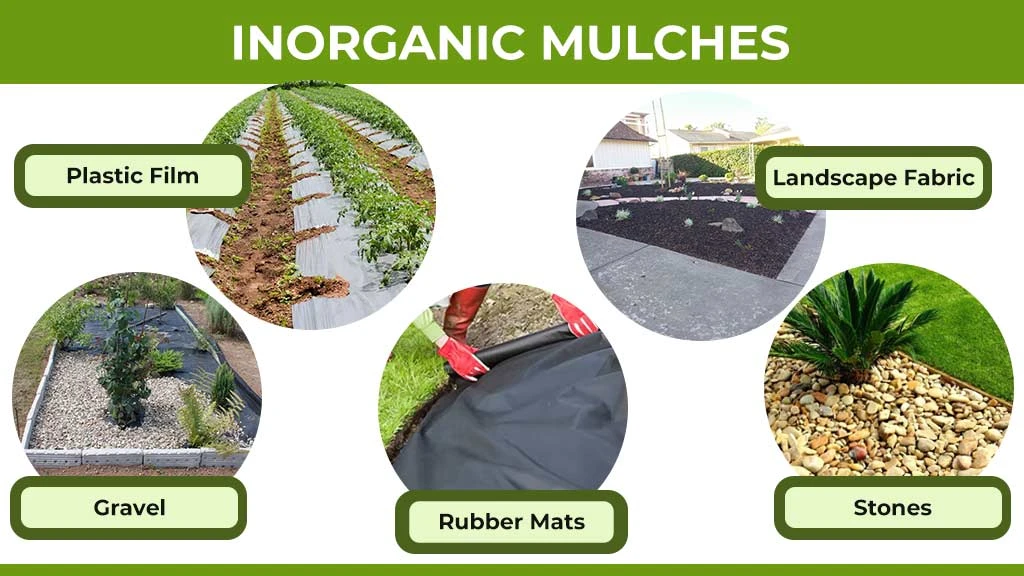
Inorganic mulch includes materials like plastic film, landscape fabric, gravel, stones, or rubber mats. Inorganic mulches do not break down quickly and are used for long-term weed control. They are more durable than organic mulches but do not offer additional nutrients to the soil. However, the most widely used inorganic mulch in India is plastic film.
What are the Benefits of Mulching in Agriculture?
- Mulches can help reduce evaporation losses and weed infestation to improve the percolation and retention rate of soil and help in conserving soil moisture.
- It helps in reducing soil compaction and erosion by protecting the soil from wind and water erosion.
- It regulates soil temperature as it covers the soil surface and maintains the soil temperature.
- Organic mulching can enhance soil fertility by exerting numerous beneficial impacts on soil quality, thereby improving nutrient levels.
- Mulching helps mitigate salt stress in the soil by improving the soil’s water retention capability and reducing evapotranspiration.
- Mulching materials are widely used for growing various herbs and tree species, thereby helping to promote plant growth and development. It is also favorable for maximum yield with low input resources.
- It helps in the diminution of diseases as it acts as a barrier against irrigation water and the beating action of raindrops, which carry spores of various diseases.
- Mulching helps control weed populations in both nursery and field conditions, resulting in a decline in weed populations.
What are the Different Mulching Techniques Used in India?
The different types of organic and inorganic mulching techniques used in India are sheet, straw, wood chip, grass clipping, shredded leaves, compost, and plastic mulching. Let’s discuss them in brief:
- Sheet Mulching: In this technique, layering cardboard, landscape fabric, newspapers, etc., are used, followed by organic mulching to develop a weed-resistant and water-retentive mulching bed.
- Straw Mulching: Straw is the widely used organic mulch in India. It comes from grains such as wheat, oats and rice. It can be spread manually or with the help of a machine. After decomposing, the straw makes the soil fertile, which is beneficial for plant growth.
- Wood Chip Mulching: Wood chips are used as organic mulching in agricultural fields, particularly gardens. They are spread around trees and shrubs to enhance soil quality and moisture retention. Wood chips decompose slowly, helping to retain soil moisture and control weeds.
- Grass Clipping Mulching: A thin layer of grass clippings is spread over seedlings, and then a dry grass layer should be spread over the crop area. Grass clippings treated with pesticides are not used in the mulching process.
- Shredded Leaves Mulching: The shredded leaves are one of the natural mulches. They prevent evaporation and break down quickly, adding nutritious organic matter to the soil.
- Compost Mulching: This technique involves applying a layer of compost to the soil surface to improve soil fertility and plant health.
- Plastic Mulching: Plastic mulching involves covering the soil's surface with a layer of plastic film. These mulches are impermeable to water, preventing direct evaporation of moisture from the soil and thus limiting water losses and soil erosion over the surface. As a result, it conserves more water than organic mulching. Today, most LLDPE-based plastic mulch is used in our country.
How to Apply Mulch to Obtain Maximum Benefit in Agriculture?
Mulching can be used in different methods according to the type of soil, climate and mulch material. Let’s discuss the process in detail:
- Select the suitable type and amount of mulch material based on your crop type and site conditions. You need to consider some factors before selection, such as availability, appearance, durability, cost, biodegradability and compatibility with your soil and crop.
- Before applying the mulch, you need to prepare the soil and plant the crop. You need to ensure that the soil is moist and well-drained and remove any weeds, debris or stones present on the soil surface.
- After that, apply the mulch evenly over the soil surface around the crops. You need to leave some space around the crop stems to avoid suffocation or rotting.
- You need to monitor and maintain the mulch throughout the harvesting season. Look for any signs of diseases, pests, weeds, or moisture problems under the mulch and adjust accordingly.
- At the end of the growing season or after harvest, you need to remove or recycle the mulch. You can compost or incorporate organic mulches into the soil to enhance its fertility and structure. If inorganic mulches are used, it is essential to collect and dispose the mulch properly to prevent environmental pollution.
Which Irrigation Practices are followed under Mulching in India?
- Lateral pipelines, which are crucial for the distribution of water, are strategically placed under the mulch film in drip irrigation. This film serves to conserve moisture, suppress weed growth, and enhance soil structure.
- In flooding, the irrigation water passes through the semi-circular holes in the mulch sheet.
- Regulate the water flow through a small pipe or through the holes made in the mulch film by keeping the laterals and drippers on top of the mulch film in the inter-cultivation practices.
What are the Limitations of Mulching in India?
- It can keep the poorly drained soil too moist, resulting in restricted oxygen in the root zone. If it is applied near or in contact with the stalk, the trapped moisture creates an environment conducive to the growth of pests and diseases.
- Many organic mulches can develop a breeding ground for various pests and diseases.
- Some organic mulches, like hay and straw, contain seeds that may become weeds. Moreover, they are biodegradable and serve for only a short period.
Frequently Asked Questions On Step-by-Step Guide to Mulching for Indian Farms: Types, Process and Best Practices
1. Is mulching a soil management method?
Yes, mulching covers the soil with different organic and inorganic substances, conserving soil moisture for better crop productivity.
2. What are the benefits of mulching?
Mulching helps conserve soil moisture, reduce soil temperature, reduce weed growth, and increase crop yields.
3. How many types of mulching are there?
Two types of mulching are practised in India: organic and inorganic.
4. How does mulching help maintain soil quality?
Mulching protects the top layer of the soil, thus helping to maintain the overall soil quality.


Related Blogs
